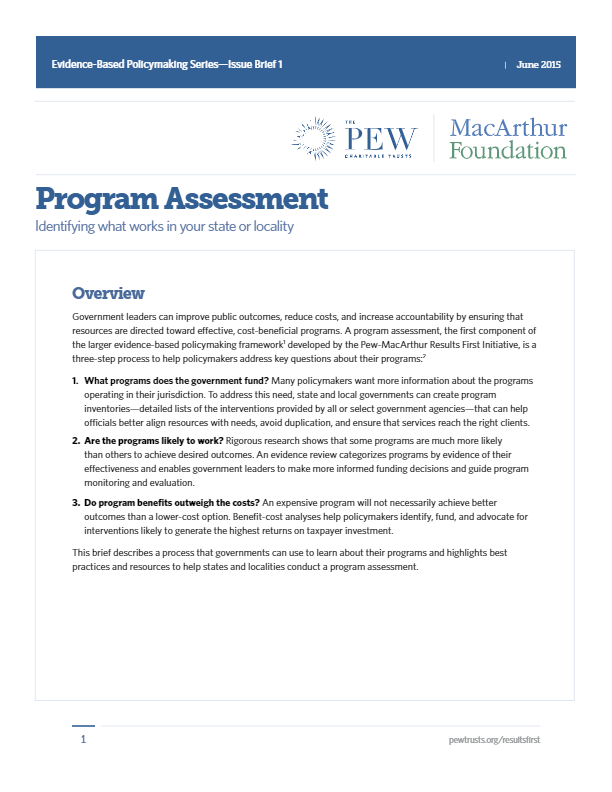This brief is one in a series about the five key components of evidence-based policymaking as identified in “Evidence-Based Policymaking: A Guide for Effective Government,” a 2014 report by the Pew-MacArthur Results First Initiative. The other components are budget development, implementation oversight, and outcome monitoring, and targeted evaluations.
Government leaders can improve public outcomes, reduce costs, and increase accountability by ensuring that resources are directed toward effective, cost-beneficial programs. A program assessment, the first component of the larger evidence-based policymaking framework developed by the Pew-MacArthur Results First Initiative, is a three-step process to help policymakers address key questions about their programs.
- What programs does the government fund? Many policymakers want more information about the programs operating in their jurisdiction. To address this need, state and local governments can create program inventories—detailed lists of the interventions provided by all or select government agencies—that can help officials better align resources with needs, avoid duplication, and ensure that services reach the right clients.
- Are the programs likely to work? Rigorous research shows that some programs are much more likely than others to achieve desired outcomes. An evidence review categorizes programs by evidence of their effectiveness and enables government leaders to make more informed funding decisions and guide program monitoring and evaluation.
- Do program benefits outweigh the costs? An expensive program will not necessarily achieve better outcomes than a lower-cost option. Benefit-cost analyses help policymakers identify, fund, and advocate for interventions likely to generate the highest returns on taxpayer investment.
This brief describes a process that governments can use to learn about their programs and highlights best practices and resources to help states and localities conduct a program assessment.
The Results First initiative, a project supported by The Pew Charitable Trusts and the John D. and Catherine T. MacArthur Foundation, authored this publication.
Key Information
Source
Results First™
Publication DateJune 15, 2015
Read Time1 min
ComponentProgram Assessment
Resource TypeWritten Briefs
Results First Resources
Evidence-Based Policymaking Resource Center
Share This Page
LET’S STAY IN TOUCH
Join the Evidence-to-Impact Mailing List
Keep up to date with the latest resources, events, and news from the EIC.




